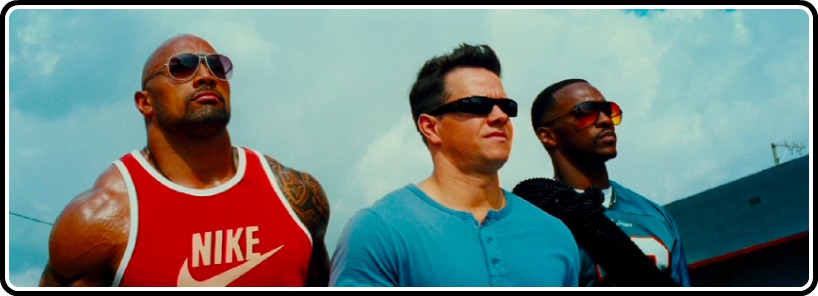
I’ll keep it simple right up front – this is an astounding, truly great motion picture.
Michael Bay’s previous films have run the gamut between actively awful (Pearl Harbor, Transformers: Revenge of the Fallen) to discordantly dull (Transformers, The Island, Bad Boys) to rousingly entertaining (The Rock, Armageddon) to occupying a cinematic space so distinctly their own so successfully that they become some sort of twisted masterpiece (Bad Boys II, Transformers: Dark of the Moon). Perhaps needless to say, I adore Bay’s twisted side, the way he somehow gets these strikingly bleak portraits of sociopaths as heroes out to millions of moviegoers and makes tons of money doing it. Beyond their commercial curiosity, the films themselves are aesthetically assaultive, assured of their brazen disregard for basic decency, and outlandishly, relentlessly inventive, setting them vastly apart from the faceless milieu in which he works and lending a genuine force of personality to a branded landscape.
Making three hit movies out of an action figure series has finally given Bay the space to make the “small, quirky, personal project” he’s long discussed, and the result, Pain & Gain, is an astounding accomplishment. A fiery, full-throated condemnation of a commercially-warped vision of the “American Dream,” and a completely fearless dive into delusion and incompetence, this is a film in which victims and perpetrators alike are deeply awful human beings to such an extent that the idea that any sort of justice could ever be served in an attempt to account for what takes place is utterly absurd. But then, this is an absurd story.
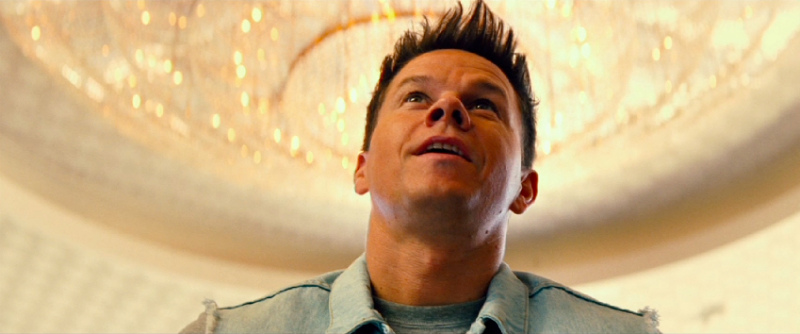
Its absurdity only begins with the fact that it really happened, back in 1995. The film is based on a real incident (or series thereof) in which a group of Miami bodybuilders, lead by the head trainer at a local gym, kidnapped a rich client, Victor Kershaw (Tony Shalhoub), and forced him to sign over all of his assets to them. Daniel Lugo (Mark Wahlberg) is the leader of the outfit, and is in it for – relatively – ideological reasons. He states right up front that he really just wants a big lawn he can ride around mowing for hours. Adrian Doorbal (Anthony Mackie) is starting to feel the sexual side effects of steroid use, and needs money for medical procedures. Paul Doyle (Dwayne Johnson)? At first he’s just along for the ride, but the former-alcoholic-slash-drug-addict-turned-devout-Christian won’t be taking the high road much longer himself.
Bay gives his characters – these three, as well as many others – both the courtesy and disserve to introduce themselves in an extended, magnificent series of voiceovers and compositions that let us know right away, this will be the story as it happened (with some creative licenses, naturally), but from the viewpoint of these three guys, Daniel in particular. Wahlberg’s greatest asset as an actor has always been his unabashed earnestness, and his best directors tweak that in such a way that makes you question whether this guy really should be this eager about his purpose. Given that Daniel links himself to his stated heroes – Rocky, Scarface, the guys in The Godfather – a downward trajectory is inevitable. He wants the high life he thinks is owed to him after working so hard on his body, and easily convinces Adrian and Paul, who each see themselves as sort of warriors in a righteous cause, to go along with him.
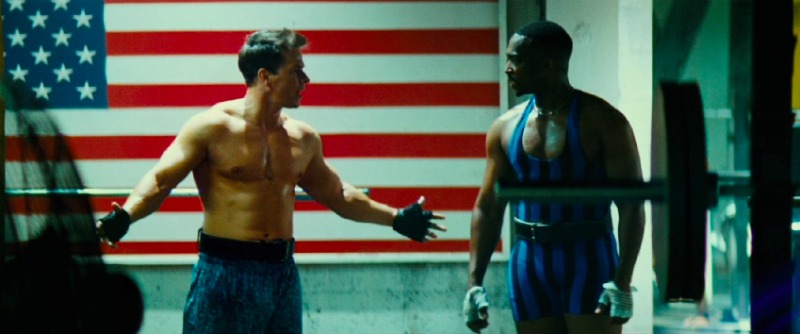
Now, by so closely aligning his cinema to these characters, it could appear as if Bay is glorifying them the way they glorify themselves. Nonsense, given how totally ridiculous he so often makes them look (their disguises during the kidnapping, which itself fails several times over, should pretty much cement that), and how thoroughly they manage to screw up nearly every stage of the process, never letting an ounce of self-awareness get past their shield of machismo. That all three actors aren’t afraid of look like doofuses goes a long way as well. Mackie and Wahlberg give truly brave performances, subverting their screen images by pathetically imitating the very personas they so often embody. “I watch a lotta movies, Paul,” Daniel says at one point, “I know what I’m doing.”
Johnson, however, is on a whole other level of idiocy, using religion, drugs, booze, and sex interchangeably, depending on what’s most convenient or fashionable. His line readings are sharply observed, twisting banal dialogue into hilarious character moments, and using small seconds to heighten his character’s cowardice. But his real achievement is all in the eyes, forever dumbfounded by anything he’s involved in, be in a widespread crime spree or a simple conversation. It’s rare to see someone play vacancy this well.
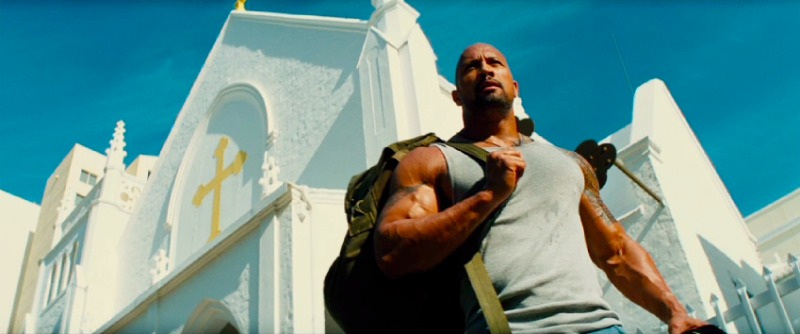
Setting these guys in hero shots, against American flags, blazing sunsets, churches, and neon lights, in fast cars and alongside beautiful women, Bay isn’t intimidated by their confidence, but emboldened, giving them everything they could ever want in the movie of their lives, only to show how very poorly they stand up to it. Using a very keen sense of irony contrast the distance between what these characters do and say and how they see themselves, he makes a Michael Bay film out of the least heroic subjects. It’s hilarious, sure (riotously so), but also weirdly unnerving, with Steve Jablonsky’s score perfectly toeing the line between heroic theme music and psychological unease. The clip at the end of this is but a small slice of the funny, but ultimately kind of sad and damning light in which they gradually paint these characters.
Bay’s sometimes-assaultive editing, along with his choice (with cinematographer Ben Seresin) to shoot on a wide variety of cameras and formats, serves him well as events spiral out of control more and more quickly, the situation moving far faster that these three can keep up with it. The violence is very brutal, and is only funny in the darkest comedic sense, never sacrificing the effects of even a punch for merely a laugh. Allies are made quickly and dishonestly, from Daniel’s boss at the gym (a deliciously corruptible Rob Corddry) to a stripper fooled into thinking the boys work for the CIA (a gloriously unrestrained Bar Paly), but Bay keeps it all – the multiple voiceovers, the assorted plot threads, the big cast – tightly focused without sacrificing the freedom he characteristically gives his cast. Wahlberg has noted in interviews that they were constantly directed to get crazier and crazier with the material, and Bay gets the level of truly committed insanity he’s been chasing since Bad Boys II, finally not in service of a big-tent hero story, but an utter evisceration of the culture of image.
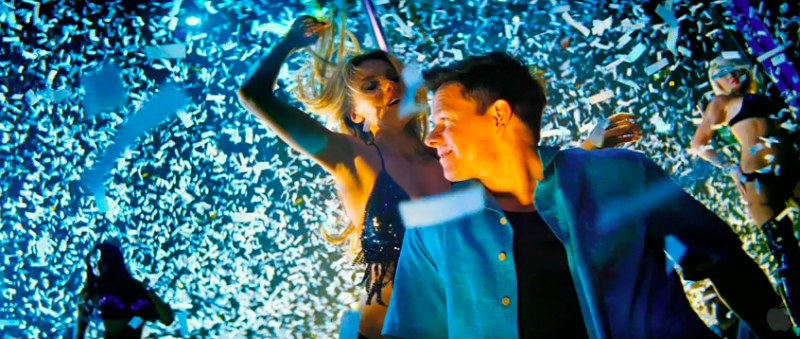
Some have suggested Bay is satirizing himself, that he’s equally complicit in the culture he’s now criticizing. Maybe there’s some truth to that, and maybe this is his recognition of responsibility. But when I watch Bad Boys II or the Transformers films, I don’t see heroes – I see sociopaths and assholes who have somehow convinced the world that they’re heroes. Pain & Gain doesn’t afford these types the same breaks they’ve had in the past, and so their quest for self-aggrandizement isn’t funneled through the law or an outsider attempt to save the world, but through theft, torture, and murder. Each of the three represent different aspects that drive men to do so many horrible things. Daniel is money and status, Adrian sex, and Paul religion. Any of these can be positive forces, unless they’re taken on selfishly and carelessly. Like anyone chasing the American Dream, they think they’re owed more than they’ve yet been accorded, but Bay’s condemnation does not end with the quickness with which they expect it. Victor, for all the horrible violence he endures at their hands, is just as much an asshole, through and through, just a terrible person from start to finish. He worked his way through college and up the rungs of society, the “right” way, and it’d probably be impossible for him to start out more detestable than he currently is. The only decent people in this story are so because they live decently, investing their lives into the things they care about, and thinking about the worldly pleasures afterwards, if at all.
Michael Bay has given us one of the best films of the year thus far, and one so insane and incendiary, I’m genuinely in shock that a major studio financed and is releasing it. Would that all filmmakers used their clout to do something this big, bold, fierce, and accomplished.





![Bergman Island (The Criterion Collection) [Blu-ray]](https://criterioncast.com/wp-content/uploads/2022/11/bergman-island-the-criterion-collection-blu-ray-400x496.jpg)
![This Is Not a Burial, It’s a Resurrection (The Criterion Collection) [Blu-ray]](https://criterioncast.com/wp-content/uploads/2022/11/this-is-not-a-burial-its-a-resurrection-the-criterion-collection-blu-ray-400x496.jpg)
![Lars von Trier's Europe Trilogy (The Criterion Collection) [The Element of Crime/Epidemic/Europa] [Blu-ray]](https://criterioncast.com/wp-content/uploads/2022/11/lars-von-triers-europe-trilogy-the-criterion-collection-the-element-of-400x496.jpg)
![Imitation of Life (The Criterion Collection) [Blu-ray]](https://criterioncast.com/wp-content/uploads/2022/11/imitation-of-life-the-criterion-collection-blu-ray-400x496.jpg)
![The Adventures of Baron Munchausen (The Criterion Collection) [4K UHD]](https://criterioncast.com/wp-content/uploads/2022/11/the-adventures-of-baron-munchausen-the-criterion-collection-4k-uhd-400x496.jpg)
![Cooley High [Criterion Collection] [Blu-ray] [1975]](https://criterioncast.com/wp-content/uploads/2022/11/cooley-high-criterion-collection-blu-ray-1975-400x496.jpg)
well alright then… :)